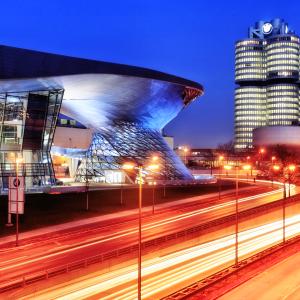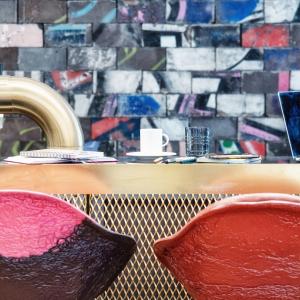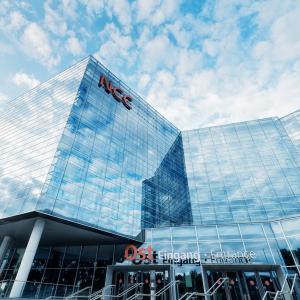A hotel in Erlangen is leaving a positive mark on the climate. And under its young director Ben Förtsch, it is also setting real standards in terms of sustainability.
Why so green, Luise?
Sometimes Ben Förtsch wonders about himself. "Actually, I had resolved not to become as green as my parents." He laughs. "But in the meantime I have long since overtaken them!” Förtsch's parents had already run the family business, which opened in 1956, in an environmentally friendly way. Ben, the third generation in the "Luise", went the extra mile. The trigger was his school exchange year in the nature of New Zealand. He understood then, he says, that the world is too beautiful to let it suffer from climate change. Ben Förtsch has been managing director of the Creativhotel Luise since 2014, and since then he has been focusing on a maximally sustainable form of hotel business.
The Creativhotel Luise is located on the edge of the centre of Erlangen. The headquarters of Siemens Healthcare is just around the corner. Before covid, 80 percent of the guests checking in were business travellers, but Förtsch has since transformed the hotel into a city hotel for guests for whom environmentally conscious living is important, regardless of the reason for their trip to Erlangen. Guests get a first impression from the outside: a pine tree grows next to a glass house on the green flat roof. The façade behind it is clad in wood.
Neutral is trivial. Positive is better!
In 2015, the Creativhotel Luise was the first hotel to leave a positive carbon footprint, i.e. it absorbed more CO2 than it emitted. The "Luise" has even been climate neutral, i.e. without a footprint, since 2010. "But neutral is nothing," smiles the young hotelier. "After all, future generations should benefit from our actions. And that is only the case if we compensate more CO2 than we emit."
The way to get there at the "Luise" is first to maximise savings, then to compensate for the CO2 that cannot be saved away. "We keep emissions, waste production and the use of disposable items as low as possible," Förtsch reports. "We recycle in-house, work only with reusable packaging, give discarded furniture or linen to social projects." In this way, the hotel follows the "cradle-to-cradle" principle, the ideal of a circular economy in which materials can be used again and again.
CO2 is generously measured, and overcompensated for
The hotel is certified by Viabono, an independent organisation that measures the sustainability of companies especially for the travel industry. Criteria are key figures on final energy, CO2, water and residual waste. The purchase of organic products, those from the region and from fair trade is also required.
The "Luise" calculates its CO2 emissions according to Scope 3 of the international Greenhouse Gas Protocol calculation tool. Scope 3 deals with emissions that occur, for example, during travel, purchase of goods, use of goods, services and waste disposal. This allows problem areas in the supply chain to be uncovered and avoided. Almost every detail in the hotel is checked for its CO2 production, from staff travel to cut flowers, and flows into the overall bill. To ensure that everything is covered, Viabono adds a risk surcharge of 20 percent to the total amount. This determines the CO2 footprint of the "Luise", it currently amounts to approx. 11.7 kilogrammes of CO2 per overnight stay. The hotel offsets this footprint by making payments to a reforestation project in Panama.
With us you can sleep, eat and shower endlessly, but without a guilty conscience. You’re even having a positive impact on the environment. You're a hero!
"But we don't just compensate, we even overcompensate by ten percent," says Förtsch. It is this step that transforms climate neutrality into a climate-positive footprint. Because of this, but also because of its sustainability philosophy, the hotel was accepted into the "Climate Hotels" cooperation, as one of currently nine accommodations throughout Germany.
Förtsch emphasises that climate positivity, sustainability and circular economy for guests do not mean sacrificing a bit of comfort. Patched bed linen and funky lights on the wobbly flea market bedside table? Not something you need to fear at the "Luise". Instead, guests can look forward to "regrowing hotel rooms". These rooms have floors made of recycled fishing nets, walls and ceilings are made of wood and straw building boards, the beds are made of natural rubber, algae and coconut fibres. The NASA astronaut shower in the bathroom uses 90 per cent less water and 80 per cent less energy than conventional models. Guests still come out clean and refreshed. This is exactly what Förtsch wants to communicate to his guests. "The message is: you can sleep, eat and shower endlessly here, but without a guilty conscience. You’re even having a positive impact on the environment. You are a hero!" That can be a strong gratification for guests.
Old plastic? Often the more sustainable solution
It is clear that "zero waste" occurs at the hotel breakfast. There is not a single plastic package on the buffet, instead organic and fair-trade products. The honey comes from the hotel's own beehives. But wait a minute, there's a plastic phylactery in the vase! The hotel manager smiles. Sustainability does not necessarily mean throwing away old things and replacing them with new ones with a sustainability label. "Not everything is brand new here. But we don’t throw it away because of this. The most sustainable solution is not always the most attractive.”
Förtsch enjoys gardening and has planted apple and pear trees in the hotel garden. The other day, a reviewer commented that the garden "needed to be redone", he says. It was autumn, there were wilted plants in the garden. For good reason: the animals should be able to collect the last seeds and fruits for the winter. "That's nothing negative," says the hotelier. "But it takes the right perspective for a guest to recognise something like that. Or just the encounter with us, which we then explain."
His tip for colleagues: just take the first step
And how does it continue? Ben Förtsch wants to further expand the circular principle. "Luise" is to become a "circular hotel". Step by step, things are moving forward: the garden leaves are no longer to go into the organic waste bin, but are to be used as humus to nourish the soil in the garden, where more will then grow again. The kitchen should soon get by without plastic. If he could also get the recycling concept rolling in the social sector, a dream would come true for Förtsch. "It would be nice if the children of our employees started working here in the hotel at some point. Or if the grandparents stop by with their knowledge and experience. He advises his fellow hoteliers who want to change to sustainability and climate positivity not to radically overturn everything, but to start with a single, clear step. "Everything else will follow on its own. And takes a little time. But you can't wait any longer to start, because time is running out."
For more information on Creativhotel Luise, click here.



